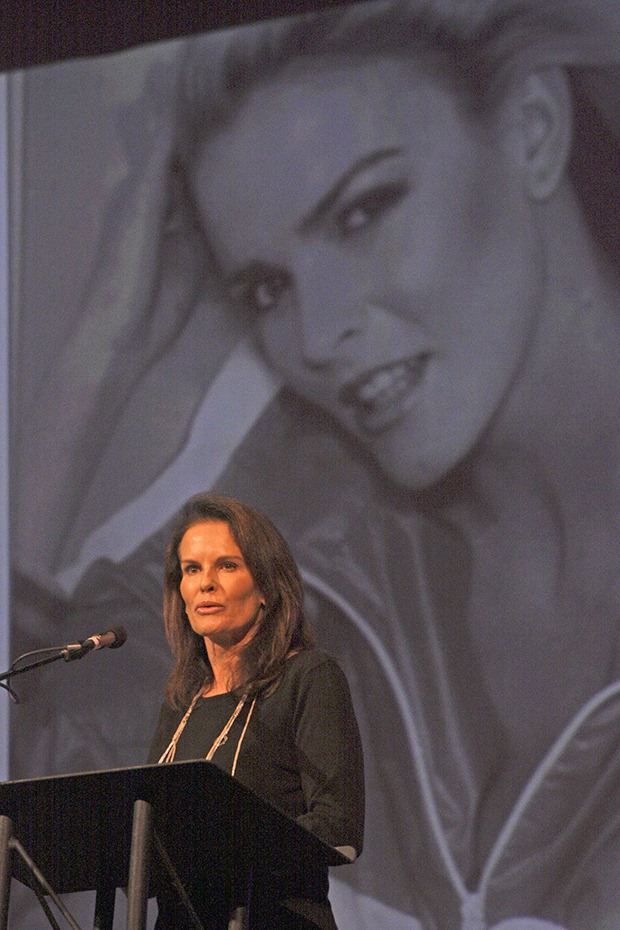Stepping out of the shadows of her sister’s death, Denise Brown has found light and purpose.
She travels throughout the country – and the world – to speak about the ravages of domestic violence.
On Friday, she visited Auburn, joining community and area leaders to discuss the problem and to remember her sister, Nicole Brown Simpson, the ex-wife of O.J. Simpson, who was murdered along with her friend outside her Southern California home on June 12, 1994.
The pain of her sister’s death still stings today for Brown, who shared personal, family photos of her late sister with the public for the first time.
“It just breaks my heart. It’s been 21 years and it still chills me. It doesn’t get easier, the tears get less,” Brown told a large gathering at Grace Community Church for a community-sponsored domestic violence event. “We were so close. We were always together, always watching each other’s backs … always doing things together.
“She lived a nightmare,” Brown said, “and I didn’t know anything about that nightmare until we read her notes in her diary. … Nicole never talked about it. She never let us know that anything was wrong in her life.”
Shortly after her death, the Nicole Brown Foundation was established to provide urgently needed funding to battered women shelters throughout the country.
Reforms followed. Congress passed the Violence Against Women Act. Nearly every state in the nation passed laws to help prevent domestic violence.
The laws and increased availability of counseling and shelter programs are subsequently saving lives, according to experts, but the problem isn’t going away.
As Mayor Nancy Backus put it, “(Auburn’s DV) statistics are alarming.”
More work is needed, Brown said. She and her family remain committed to the cause, immersing themselves in the education of the cycle of violence.
In the aftermath of her sister’s death, Brown stepped in. She channeled her grief over her sister’s death into advocacy for women who live the same kind of violence she says her sister kept hidden before her death. She is working to stop domestic violence, and tours and speaks throughout the country on the issue at shelters, schools, churches, hospitals and prisons.
“I realized there are more people out there who have been devastated by domestic violence,” Brown said, “and I wasn’t the only one determined to end the epidemic of domestic violence. There were so many people.
“A whole new world opened up to me,” she said. “I knew nothing about it, but I learned about it really fast. I learned it first hand, through my travels, talking to people and their stories.”
Brown learns something new at each visit.
The community, she said, must pull together to stop the problem.
“You need to spread the word … you can be strong and save a life,” Brown told the audience.
“I pledge to continue my efforts, to speak about domestic violence, to cry for my sister, to share stories and pictures,” she said. “But I hope my education today will be your education tomorrow, and (that) you will be able to spread the word and share stories and what you’ve learned today.
“Everybody needs to be involved. If people are not involved, somebody could end up losing their life. And you know what? This is about not losing lives,” she said. “We want to save lives and have communities working together so we can put an end to domestic violence.”
Notes
City leaders and the Auburn Domestic Violence Task Force welcomed Brown to the valley last Thursday and joined her in planting a purple rhododendron in front of City Hall to honor Nicole. Purple is the hue that represents domestic violence awareness. … October is Domestic Violence Awareness Month. … The City’s task force, Coordinated Community Response Against Domestic Violence (a nonprofit agency) and the Muckleshoot Tribal Council presented the event at Grace Church. … Proceeds from the event supported survivors of domestic violence. …
Guest speakers at Friday’s event included Lisa Moore, whose brother, 45-year-old Randy Ferguson, was murdered by his wife, Angela, in 2006 in their South Hill home, bringing a terrible end to years of constant verbal and emotional abuse. “I watched my brother suffer in shame for years,” Moore said. “It was hard for me. I introduced my brother to her. They seemed to have it all together in the beginning, but I quickly learned I had made the biggest mistake of my life. … She was controlling, manipulative and jealous.”
Moore become a volunteer victim advocate, an impact public speaker who started a support group for male victims of domestic violence. She also pushed to change a state law that protected relatives who had assisted in crimes. Two of Angela’s children from a previous marriage helped dispose of Randy’s body, hide evidence and lied to protect their mother. Under lenient laws at the time, they were charged with only a gross misdemeanor and avoided jail time.
But Moore worked four years to change the law. Then-Gov. Chris Gregoire did so in 2010, signing “Randy’s Law,” which makes it a felony for adult relatives to render criminal assistance, punishable up to 10 years in prison. …
For those who would like to donate to the cause, please make payment out to the CCRADV (Coordinated Community Response Against Domestic Violence). You can choose to go to the website at www.ccradv.org, where you can view the CCRADV’s Financial Comparison Statement, using PayPal, and/or by mail by donating directly to: CCRADV, 402 S. 333rd St., Federal Way, WA 98003, or CCRADV, attn: Shelly David, domestic violence legal advocate, 25 W. Main St., Auburn, WA 98001.


